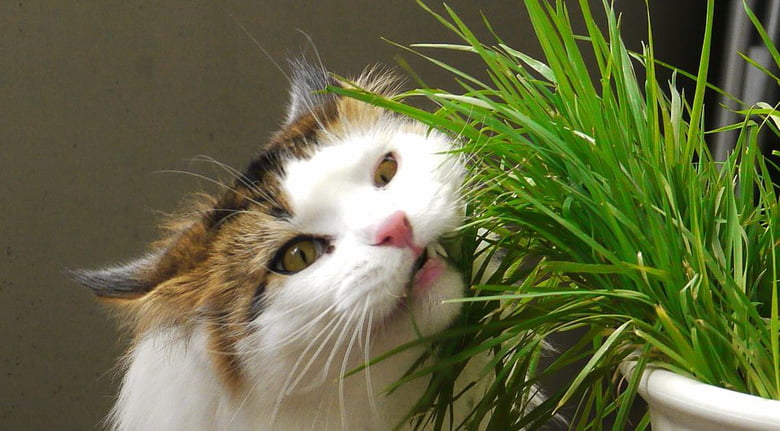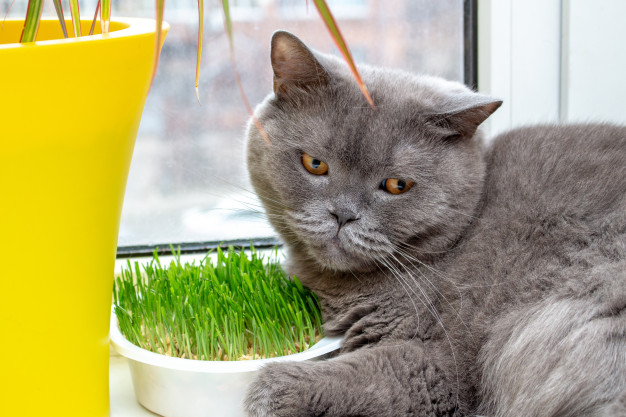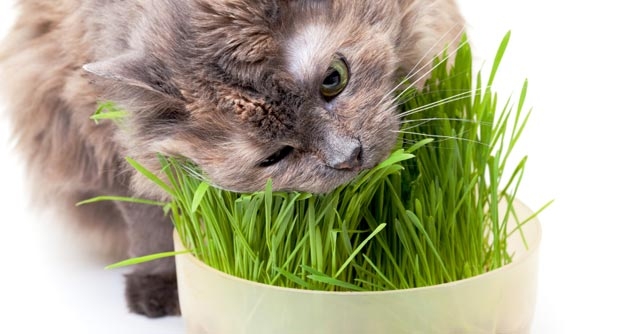Grass-eating behavior in cats is quite common. You have probably walked in on your feline friend chomping on your backyard grass once or twice. In the feline world, it is believed that cats eat grass when they have a tummy upset. Since grass has plenty of fiber, it will boost digestion in the gut making them feel better. In addition, grass binds to worms and indigestible bits which the cat will vomit out. What then happens when your cat eats grass but doesn’t vomit afterward? Is it a cause of concern for you? Well, we’ll find out shortly.
Why Do Cats Eat Grass?

Cats find rough-textured things very appealing. This explains why they spend most of their days climbing trees and playing with scratching posts. Grass has a rough texture to it which means your kitty finds it irresistible. While most people are of the opinion that cats eat grass to induce vomiting, there are more reasons your kitty can display the behavior:
- Need for Fiber: If your fur baby’s gut is blocked or has more contents than it should hold, she will eat grass in a bid to try and move all the stuff from the gut. Grass has all the fiber she needs to do that. She will also chomp on the toilet paper sometimes for this very reason. The kitty is trying to alleviate the discomfort.
- Folic Acid Deficiency: Cats need vitamin B9 (folic acid) for proper cell growth. Breast milk has lots of it meaning kittens have a flowing supply of the vitamin. Adult cats, on the other hand, may need to look for it elsewhere if their diet doesn’t have enough. Grass contains folic acid in substantial amounts which may explain why your cat cannot get over the habit of eating grass.
- Stress Eating: Most people ‘stress eat’ when they are going through a stressful period in their lives. Apparently, cats too may resort to eating grass to cope with anxiety. Granted, most kitties use over-grooming and excessive vocalizations as the main outlet of anxiety but others choose to cram down grass instead. If your cat chews on your houseplants non-stop and exhibits other anxiety symptoms such as withdrawal and aggression, get in touch with the vet to know how to best help her.
- As A Laxative: In case you had no idea, cats devour their prey whole. For instance, if your kitty caught a mouse, he will eat the whole thing including bones, feathers, and fur. Unfortunately, sometimes, these things don’t pass through the gut with ease. In such a case, a cat may consume grass to push the solids out of his digestive tract.
- Boredom: Sometimes pet parents think the worst when their feline companions eat grass when really, the poor creatures are just bored. If there are no chew toys to play with or a dead bird to throw around, your kitty may chomp on the grass to keep herself busy and entertained. If she’s happy, poops right, and doesn’t have diarrhea/vomiting, she may just enjoy playing with the grass.
- To Throw Up: Grass cannot be digested by the feline digestive system. When your kitty ingests it, it binds into other indigestible material like fur and bones and makes it easy for the system to eliminate it either through vomiting or pooping.
Do Cats Always Throw Up After Eating Grass?
A study was done to determine whether cats eat grass to throw up or just out of instinct. Out of the 1,000 cat owners that participated in the study, 77% of them said that they had witnessed their kitty eating grass not less than 6 times. Only a handful (11%) admitted to not seeing their cats eat grass ever. The findings get even more fascinating. Only 25% of the cats vomited after throwing up. The rest just didn’t throw up. Further, 91% of the kitties that vomited didn’t display any symptoms of being ill before throwing.
This only means one thing: your cat doesn’t have to vomit after eating grass. As explained before, there are plenty of reasons your kitty consumes grass. Unless he actually has a tummy upset, he will not vomit afterward. Else, if he is bored, anxious, or looking for a natural folic acid supplement, he is less likely to vomit.
Should You Worry When He Doesn’t Throw Up?

The only way you can tell whether your kitty is eating grass for other reasons than an upset tummy is by watching him like a hawk after eating grass. Look out for signs of illness or lack thereof. Gut problems should be followed by other symptoms such as decreased appetite, withdrawal, diarrhea, and vomiting. If nothing seems to be off, there’s no need to worry.
Ideally, if your kitty consumes a lot of grass, you might want to get him checked. In case he’s looking for fiber or folic acid, he may need help. Additionally, if the poor pet is throwing up frequently, a visit to the pet is mandatory. Sometimes there’s too much indigestible matter that needs to pass through the small and big intestines that the grass cannot handle. A better and safer laxative will be required in such a case.
A Note on Safety
Grass may be harmless for a cat but that does not mean you should let her eat any grass. For one, grass resembles several other plants. Since your cat cannot tell the difference, she may end up ingesting something toxic to her, thinking it is grass. If you have household plants, be sure all of them are cat-safe in case the little escape artist decided to chomp on them.
Additionally, stay away from the grass with toxic chemicals such as herbicides, fertilizers, and pesticides. If you can, get the cat something natural to munch on. There are special kitty gardens in the market today with safe grasses including barley, rye, oats, and wheat. Get those for him.
Parting Thoughts
It is clear that a cat eats grass for myriad reasons. Vomiting is one of them. If your kitty doesn’t vomit after eating grass, don’t worry. It is just because he doesn’t have a tummy upset that warrants vomiting.

Hi! I am Eleanor Price. I started this website after my cat, Louie, almost died from a case of botulism (a type of food poisoning often caused by bacteria that grow on food items). Turned out that my cat’s diet was the problem. I have made it my duty to provide the best information and recommendations about everything cat lovers need to know about their felines’ health and wellbeing. My goal is to find the most informative content on anything feline-related and share it with fellow hardworking kitty lovers.

